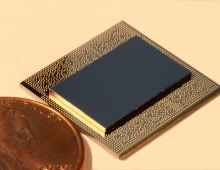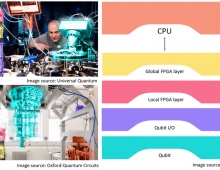
IBM Contests Google's Bold “Quantum Supremacy” Claim
IBM says that Google's recent and bold statement that its 53-qubit processors have helped achieve a "quantum supremacy" is misleading.
The original meaning of the term “quantum supremacy” was proposed by John Preskill in 2012 to describe the point where quantum computers can do things that classical computers can’t. Contrary to Google's claims, IBM says that this threshold has not been met yet.
Recent advances in quantum computing have resulted in two 53-qubit processors: one from our group in IBM and a device described in a recently leaked preprint from Google. In the preprint, Google argued that their device reached “quantum supremacy” and that “a state-of-the-art supercomputer would require approximately 10,000 years to perform the equivalent task.” IBM argues that an ideal simulation of the same task can be performed on a classical system in 2.5 days and with far greater fidelity.
IBM says that Google's particular notion of “quantum supremacy” is based on executing a random quantum circuit of a size infeasible for simulation with any available classical computer. Specifically, Google's preprint shows a computational experiment over a 53-qubit quantum processor that implements an impressively large two-qubit gate quantum circuit of depth 20, with 430 two-qubit and 1,113 single-qubit gates, and with predicted total fidelity of 0.2%. Google's classical simulation estimate of 10,000 years is based on the observation that the RAM memory requirement to store the full state vector in a Schrödinger-type simulation would be prohibitive, and thus one needs to resort to a Schrödinger-Feynman simulation that trades off space for time.
The concept of “quantum supremacy” showcases the resources unique to quantum computers, such as direct access to entanglement and superposition. However, classical computers have resources of their own such as a hierarchy of memories and high-precision computations in hardware, various software assets, and a vast knowledge base of algorithms, and IBM says that it is important to leverage all such capabilities when comparing quantum to classical.
In Google's comparison to classical was made, they relied on an advanced simulation that leverages parallelism, fast and error-free computation, and large aggregate RAM, but failed to fully account for plentiful disk storage. In contrast, IBM claims that its Schrödinger-style classical simulation approach uses both RAM and hard drive space to store and manipulate the state vector. Performance-enhancing techniques employed by IBM's simulation methodology include circuit partitioning, tensor contraction deferral, gate aggregation and batching, careful orchestration of collective communication, and well-known optimization methods such as cache-blocking and double-buffering in order to overlap the communication transpiring between and computation taking place on the CPU and GPU components of the hybrid nodes.
"Our simulation approach features a number of nice properties that do not directly transfer from the classical to quantum worlds. For instance, once computed classically, the full state vector can be accessed arbitrarily many times. The runtime of our simulation method scales approximately linearly with the circuit depth, imposing no limits such as those owing to the limited coherence times. New and better classical hardware, code optimizations to more efficiently utilize the classical hardware, not to mention the potential of leveraging GPU-direct communications to run the kind of supremacy simulations of interest, could substantially accelerate our simulation," IBM added.
Building quantum systems is a feat of science and engineering and benchmarking them is a formidable challenge.
"Google’s experiment is an excellent demonstration of the progress in superconducting-based quantum computing, showing state-of-the-art gate fidelities on a 53-qubit device, but it should not be viewed as proof that quantum computers are “supreme” over classical computers," IBM said.
The “supremacy” term is being misunderstood by nearly all (outside of the rarified world of quantum computing experts that can put it in the appropriate context). A headline that includes some variation of “Quantum Supremacy Achieved” is almost irresistible to print, but it will inevitably mislead the general public. First because, according to IBM, by its strictest definition the goal has not been met. But more fundamentally, because quantum computers will never reign “supreme” over classical computers, but will rather work in concert with them, since each have their unique strengths.





















